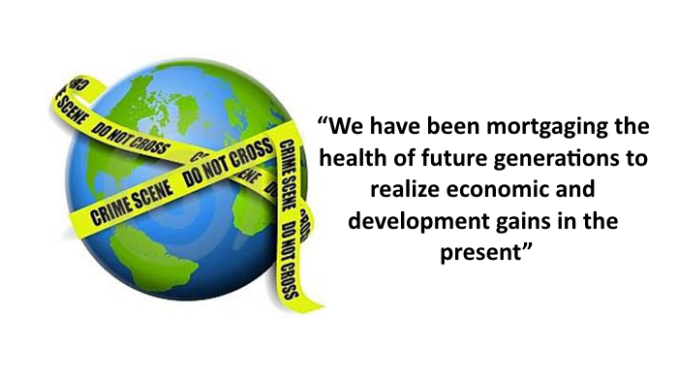
“We have been mortgaging the health of future generations to realize economic and development gains in the present”
A major report on human health in the Anthropocene, published in the British medical journal The Lancet, begins by noting an apparent paradox, that global human health has been improving even while environmental destruction is undermining it. The explanation, the authors say, is “straightforward and sobering.”
“We have been mortgaging the health of future generations to realize economic and development gains in the present. By unsustainably exploiting nature’s resources, human civilization has flourished but now risks substantial health effects from the degradation of nature’s life support systems in the future.”[1]
This is a critically important insight. Unless radical changes are made soon, the humanitarian gains made in the twentieth century will become terrible costs in the twenty-first.
“Health effects from changes to the environment including climatic change, ocean acidification, land degradation, water scarcity, overexploitation of fisheries, and biodiversity loss pose serious challenges to the global health gains of the past several decades and are likely to become increasingly dominant during the second half of this century and beyond.”[2]
Nowhere is the contradiction between past gains and current decline more evident than in contemporary agriculture. The second half of the 20th century saw extraordinary increases in agricultural production. More grains, vegetables, and meat are produced than ever in history. Although world population has doubled and nearly doubled again in the past 100 years, there is still more than enough food to provide full nutrition for everyone.
But that is only one side of the story. The other side is told by Robert Biel, in Sustainable Food Systems:
“Although it may at the moment be true that there’s enough food ‘around’ (provided we stop wasting it and distribute it fairly), the system which currently produces that food is not ecologically sustainable into the future. It’s not just that this system is failing but, more fundamentally, it is actually its successes which are eroding our future.”[3]
Karl Marx, following the agricultural chemist Justus von Liebig, called capitalist agriculture a robbery system, because it maintains current production by undermining the metabolic processes required for future production.
In Marx’s words: “All progress in capitalist agriculture is a progress in the art, not only of robbing the worker, but of robbing the soil; all progress in increasing the fertility of the soil for a given time is progress towards ruining the more long-lasting sources of that fertility”[4]
Capitalist agriculture steals from the future, and our children will suffer the consequences. As I’ve written before, it must be replaced by a society of good ancestors, one that consistently works for a better future. A system that thinks and acts to protect the interests of our grandchildren — and their grandchildren. That’s the society that ecosocialism aims to build.
Notes
[1]
“Safeguarding Human Health in the
Anthropocene Epoch,” The Lancet 386, no. 10007 (July 16, 2015).
Ironically, the study was funded by the Rockefeller Foundation, an institution
whose wealth came from the industry that has done more to destroy our future
than any other.
[2] Ibid
[3] Robert Biel, Sustainable Food Systems: The Role of the City (London: UCL Press, 2016), 6.
[4] Karl Marx, Capital, Volume 1 (London: Penguin, 1976 [1867]),
638
Re-posted with permission from climateandcapitalism.com


Be the first to comment